Report on Enterprise and Cloud Computing in the Banking Sector
VerifiedAdded on 2022/11/07
|8
|1721
|371
Report
AI Summary
This report investigates the application of enterprise and cloud computing in the banking industry, analyzing core business services, ICT workload types (batch, transactional, and analytics), and the impact of cloud technology. It highlights the benefits of cloud computing, such as cost-effectiveness, enhanced business continuity, and improved banking services. The report also discusses the role of mainframes in banking operations, emphasizing their reliability, security, and analytical capabilities. The analysis demonstrates how cloud computing and ICT workloads enhance banking services, concluding with the significant impact of these technologies on the financial sector. The report references several academic sources to support its findings.
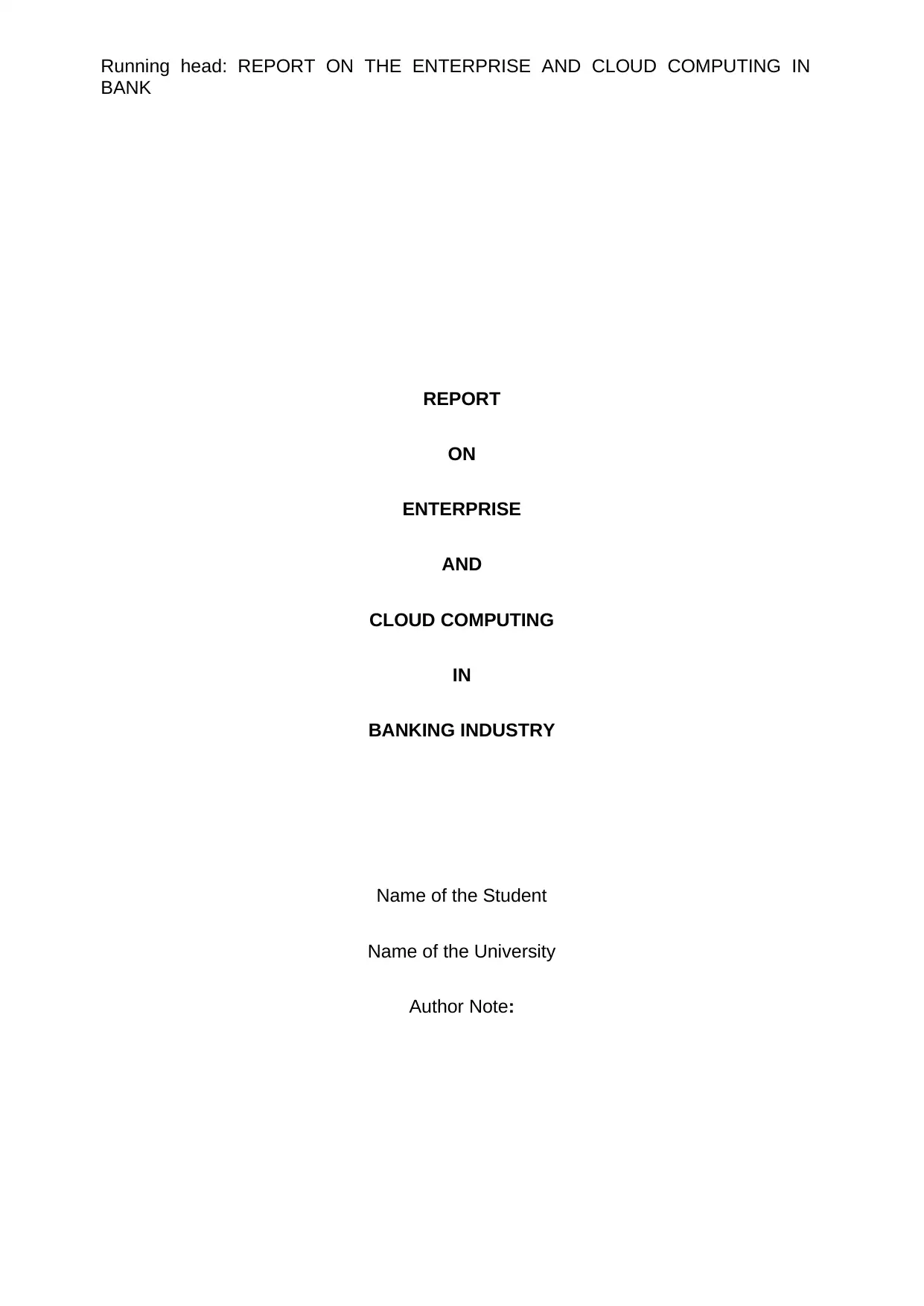
Running head: REPORT ON THE ENTERPRISE AND CLOUD COMPUTING IN
BANK
REPORT
ON
ENTERPRISE
AND
CLOUD COMPUTING
IN
BANKING INDUSTRY
Name of the Student
Name of the University
Author Note:
BANK
REPORT
ON
ENTERPRISE
AND
CLOUD COMPUTING
IN
BANKING INDUSTRY
Name of the Student
Name of the University
Author Note:
Paraphrase This Document
Need a fresh take? Get an instant paraphrase of this document with our AI Paraphraser
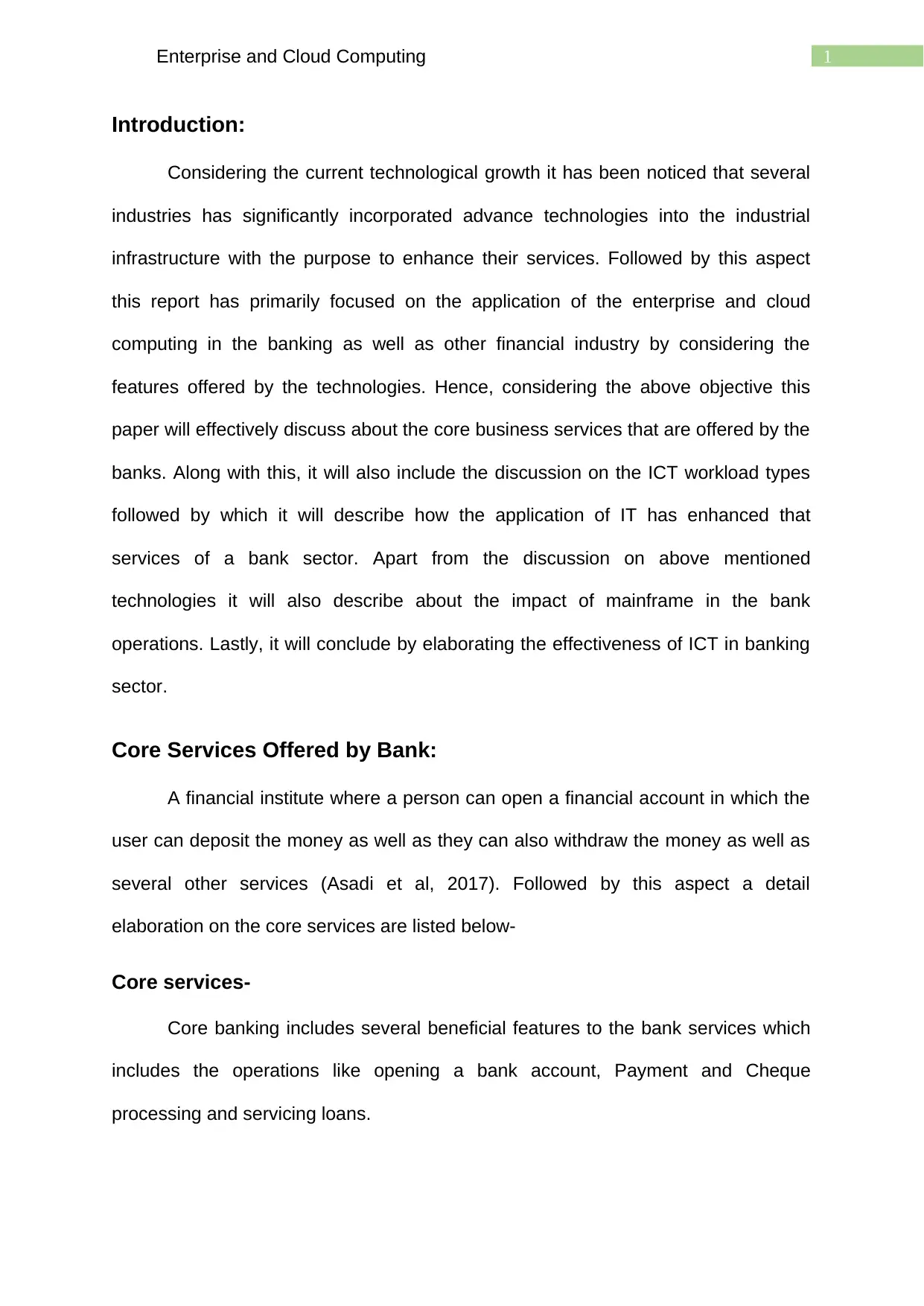
1Enterprise and Cloud Computing
Introduction:
Considering the current technological growth it has been noticed that several
industries has significantly incorporated advance technologies into the industrial
infrastructure with the purpose to enhance their services. Followed by this aspect
this report has primarily focused on the application of the enterprise and cloud
computing in the banking as well as other financial industry by considering the
features offered by the technologies. Hence, considering the above objective this
paper will effectively discuss about the core business services that are offered by the
banks. Along with this, it will also include the discussion on the ICT workload types
followed by which it will describe how the application of IT has enhanced that
services of a bank sector. Apart from the discussion on above mentioned
technologies it will also describe about the impact of mainframe in the bank
operations. Lastly, it will conclude by elaborating the effectiveness of ICT in banking
sector.
Core Services Offered by Bank:
A financial institute where a person can open a financial account in which the
user can deposit the money as well as they can also withdraw the money as well as
several other services (Asadi et al, 2017). Followed by this aspect a detail
elaboration on the core services are listed below-
Core services-
Core banking includes several beneficial features to the bank services which
includes the operations like opening a bank account, Payment and Cheque
processing and servicing loans.
Introduction:
Considering the current technological growth it has been noticed that several
industries has significantly incorporated advance technologies into the industrial
infrastructure with the purpose to enhance their services. Followed by this aspect
this report has primarily focused on the application of the enterprise and cloud
computing in the banking as well as other financial industry by considering the
features offered by the technologies. Hence, considering the above objective this
paper will effectively discuss about the core business services that are offered by the
banks. Along with this, it will also include the discussion on the ICT workload types
followed by which it will describe how the application of IT has enhanced that
services of a bank sector. Apart from the discussion on above mentioned
technologies it will also describe about the impact of mainframe in the bank
operations. Lastly, it will conclude by elaborating the effectiveness of ICT in banking
sector.
Core Services Offered by Bank:
A financial institute where a person can open a financial account in which the
user can deposit the money as well as they can also withdraw the money as well as
several other services (Asadi et al, 2017). Followed by this aspect a detail
elaboration on the core services are listed below-
Core services-
Core banking includes several beneficial features to the bank services which
includes the operations like opening a bank account, Payment and Cheque
processing and servicing loans.
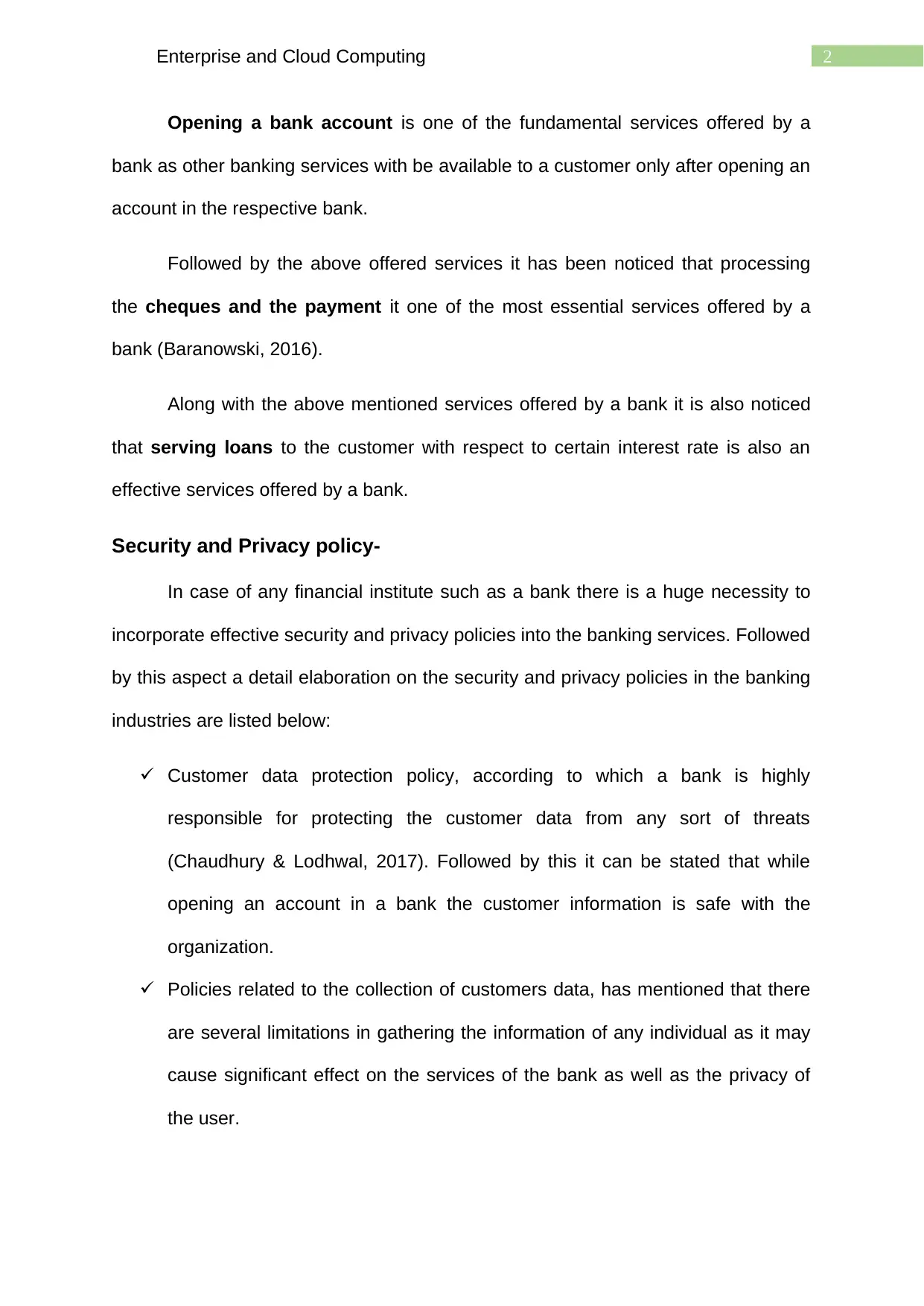
2Enterprise and Cloud Computing
Opening a bank account is one of the fundamental services offered by a
bank as other banking services with be available to a customer only after opening an
account in the respective bank.
Followed by the above offered services it has been noticed that processing
the cheques and the payment it one of the most essential services offered by a
bank (Baranowski, 2016).
Along with the above mentioned services offered by a bank it is also noticed
that serving loans to the customer with respect to certain interest rate is also an
effective services offered by a bank.
Security and Privacy policy-
In case of any financial institute such as a bank there is a huge necessity to
incorporate effective security and privacy policies into the banking services. Followed
by this aspect a detail elaboration on the security and privacy policies in the banking
industries are listed below:
Customer data protection policy, according to which a bank is highly
responsible for protecting the customer data from any sort of threats
(Chaudhury & Lodhwal, 2017). Followed by this it can be stated that while
opening an account in a bank the customer information is safe with the
organization.
Policies related to the collection of customers data, has mentioned that there
are several limitations in gathering the information of any individual as it may
cause significant effect on the services of the bank as well as the privacy of
the user.
Opening a bank account is one of the fundamental services offered by a
bank as other banking services with be available to a customer only after opening an
account in the respective bank.
Followed by the above offered services it has been noticed that processing
the cheques and the payment it one of the most essential services offered by a
bank (Baranowski, 2016).
Along with the above mentioned services offered by a bank it is also noticed
that serving loans to the customer with respect to certain interest rate is also an
effective services offered by a bank.
Security and Privacy policy-
In case of any financial institute such as a bank there is a huge necessity to
incorporate effective security and privacy policies into the banking services. Followed
by this aspect a detail elaboration on the security and privacy policies in the banking
industries are listed below:
Customer data protection policy, according to which a bank is highly
responsible for protecting the customer data from any sort of threats
(Chaudhury & Lodhwal, 2017). Followed by this it can be stated that while
opening an account in a bank the customer information is safe with the
organization.
Policies related to the collection of customers data, has mentioned that there
are several limitations in gathering the information of any individual as it may
cause significant effect on the services of the bank as well as the privacy of
the user.
⊘ This is a preview!⊘
Do you want full access?
Subscribe today to unlock all pages.

Trusted by 1+ million students worldwide
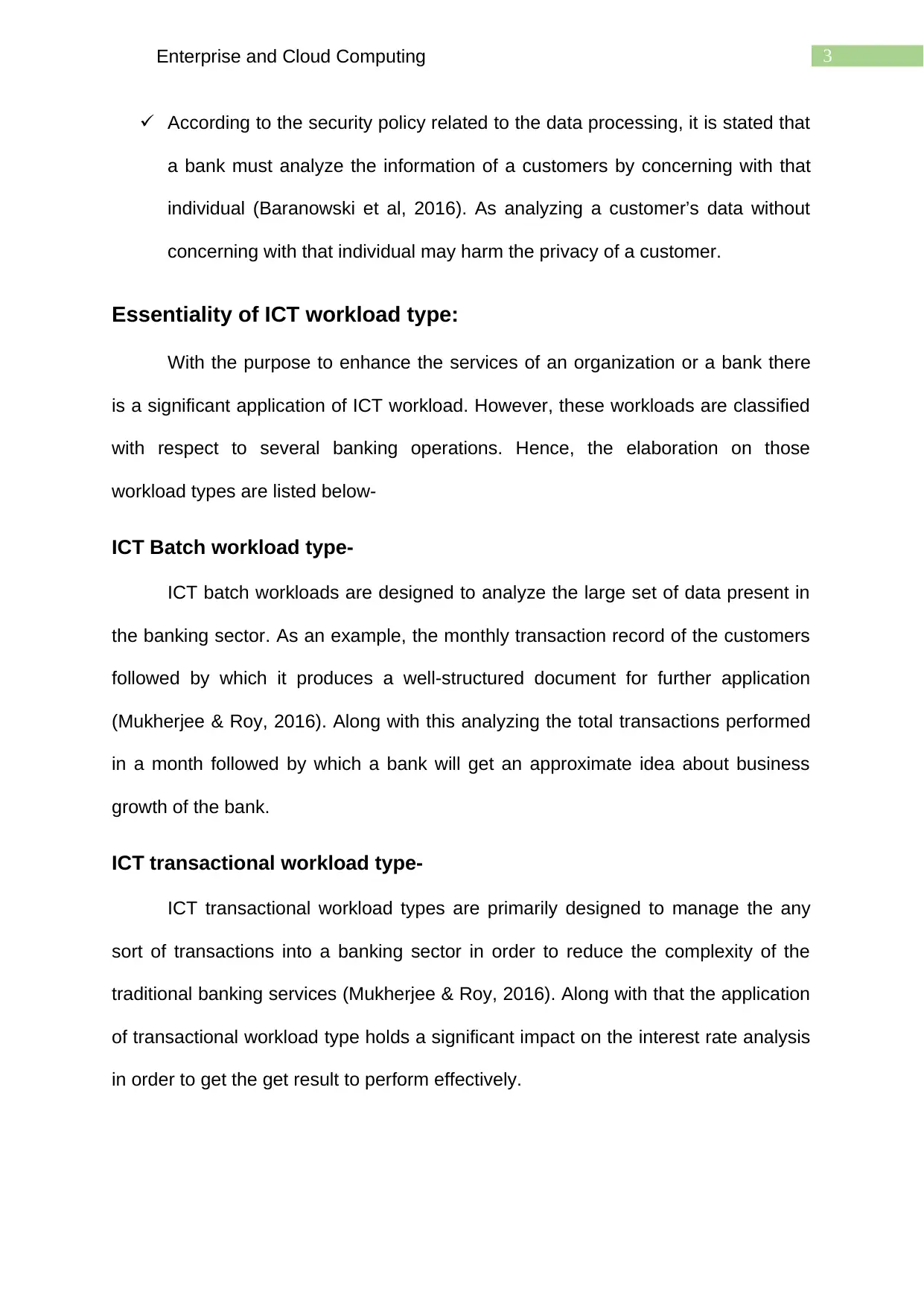
3Enterprise and Cloud Computing
According to the security policy related to the data processing, it is stated that
a bank must analyze the information of a customers by concerning with that
individual (Baranowski et al, 2016). As analyzing a customer’s data without
concerning with that individual may harm the privacy of a customer.
Essentiality of ICT workload type:
With the purpose to enhance the services of an organization or a bank there
is a significant application of ICT workload. However, these workloads are classified
with respect to several banking operations. Hence, the elaboration on those
workload types are listed below-
ICT Batch workload type-
ICT batch workloads are designed to analyze the large set of data present in
the banking sector. As an example, the monthly transaction record of the customers
followed by which it produces a well-structured document for further application
(Mukherjee & Roy, 2016). Along with this analyzing the total transactions performed
in a month followed by which a bank will get an approximate idea about business
growth of the bank.
ICT transactional workload type-
ICT transactional workload types are primarily designed to manage the any
sort of transactions into a banking sector in order to reduce the complexity of the
traditional banking services (Mukherjee & Roy, 2016). Along with that the application
of transactional workload type holds a significant impact on the interest rate analysis
in order to get the get result to perform effectively.
According to the security policy related to the data processing, it is stated that
a bank must analyze the information of a customers by concerning with that
individual (Baranowski et al, 2016). As analyzing a customer’s data without
concerning with that individual may harm the privacy of a customer.
Essentiality of ICT workload type:
With the purpose to enhance the services of an organization or a bank there
is a significant application of ICT workload. However, these workloads are classified
with respect to several banking operations. Hence, the elaboration on those
workload types are listed below-
ICT Batch workload type-
ICT batch workloads are designed to analyze the large set of data present in
the banking sector. As an example, the monthly transaction record of the customers
followed by which it produces a well-structured document for further application
(Mukherjee & Roy, 2016). Along with this analyzing the total transactions performed
in a month followed by which a bank will get an approximate idea about business
growth of the bank.
ICT transactional workload type-
ICT transactional workload types are primarily designed to manage the any
sort of transactions into a banking sector in order to reduce the complexity of the
traditional banking services (Mukherjee & Roy, 2016). Along with that the application
of transactional workload type holds a significant impact on the interest rate analysis
in order to get the get result to perform effectively.
Paraphrase This Document
Need a fresh take? Get an instant paraphrase of this document with our AI Paraphraser
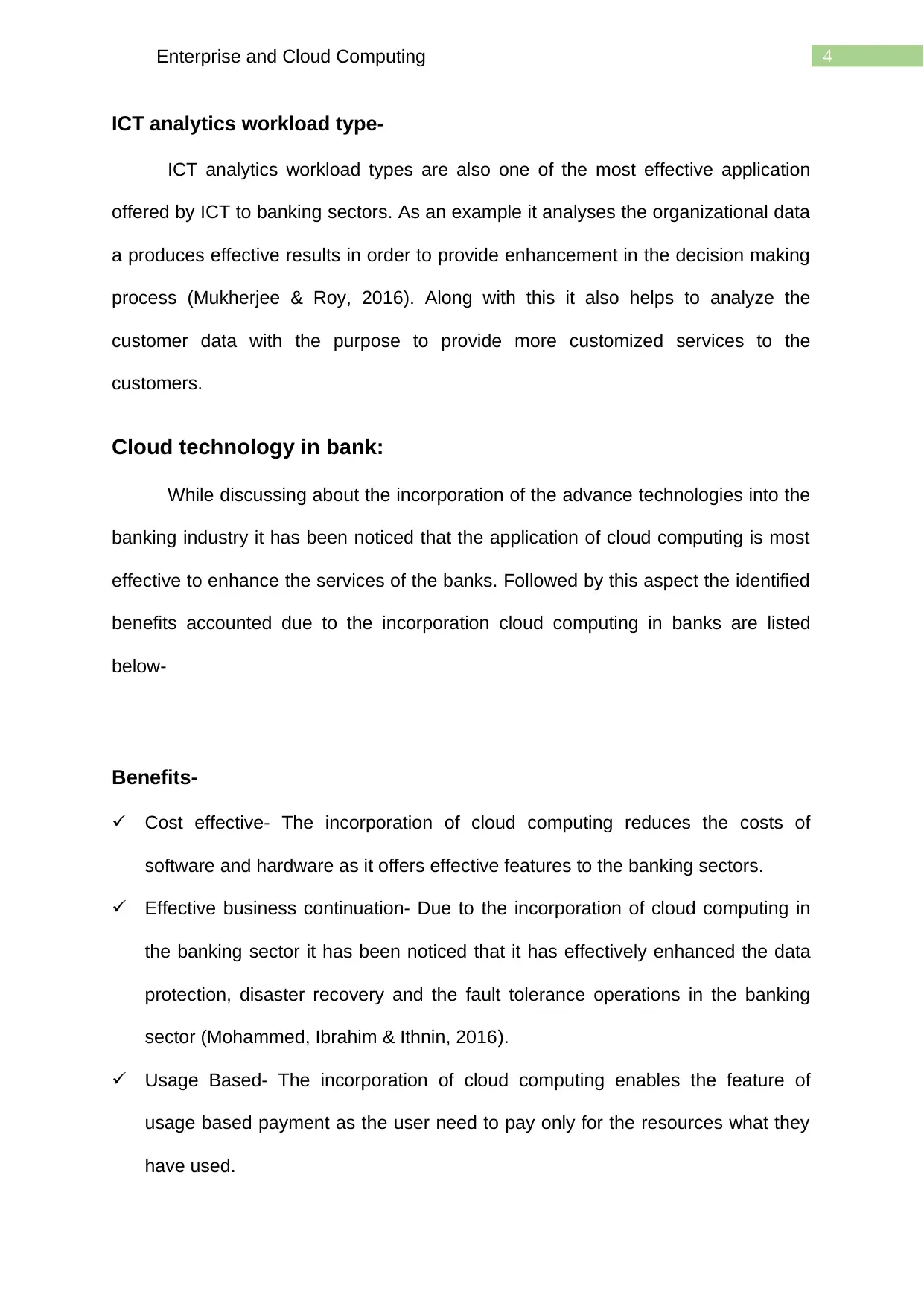
4Enterprise and Cloud Computing
ICT analytics workload type-
ICT analytics workload types are also one of the most effective application
offered by ICT to banking sectors. As an example it analyses the organizational data
a produces effective results in order to provide enhancement in the decision making
process (Mukherjee & Roy, 2016). Along with this it also helps to analyze the
customer data with the purpose to provide more customized services to the
customers.
Cloud technology in bank:
While discussing about the incorporation of the advance technologies into the
banking industry it has been noticed that the application of cloud computing is most
effective to enhance the services of the banks. Followed by this aspect the identified
benefits accounted due to the incorporation cloud computing in banks are listed
below-
Benefits-
Cost effective- The incorporation of cloud computing reduces the costs of
software and hardware as it offers effective features to the banking sectors.
Effective business continuation- Due to the incorporation of cloud computing in
the banking sector it has been noticed that it has effectively enhanced the data
protection, disaster recovery and the fault tolerance operations in the banking
sector (Mohammed, Ibrahim & Ithnin, 2016).
Usage Based- The incorporation of cloud computing enables the feature of
usage based payment as the user need to pay only for the resources what they
have used.
ICT analytics workload type-
ICT analytics workload types are also one of the most effective application
offered by ICT to banking sectors. As an example it analyses the organizational data
a produces effective results in order to provide enhancement in the decision making
process (Mukherjee & Roy, 2016). Along with this it also helps to analyze the
customer data with the purpose to provide more customized services to the
customers.
Cloud technology in bank:
While discussing about the incorporation of the advance technologies into the
banking industry it has been noticed that the application of cloud computing is most
effective to enhance the services of the banks. Followed by this aspect the identified
benefits accounted due to the incorporation cloud computing in banks are listed
below-
Benefits-
Cost effective- The incorporation of cloud computing reduces the costs of
software and hardware as it offers effective features to the banking sectors.
Effective business continuation- Due to the incorporation of cloud computing in
the banking sector it has been noticed that it has effectively enhanced the data
protection, disaster recovery and the fault tolerance operations in the banking
sector (Mohammed, Ibrahim & Ithnin, 2016).
Usage Based- The incorporation of cloud computing enables the feature of
usage based payment as the user need to pay only for the resources what they
have used.
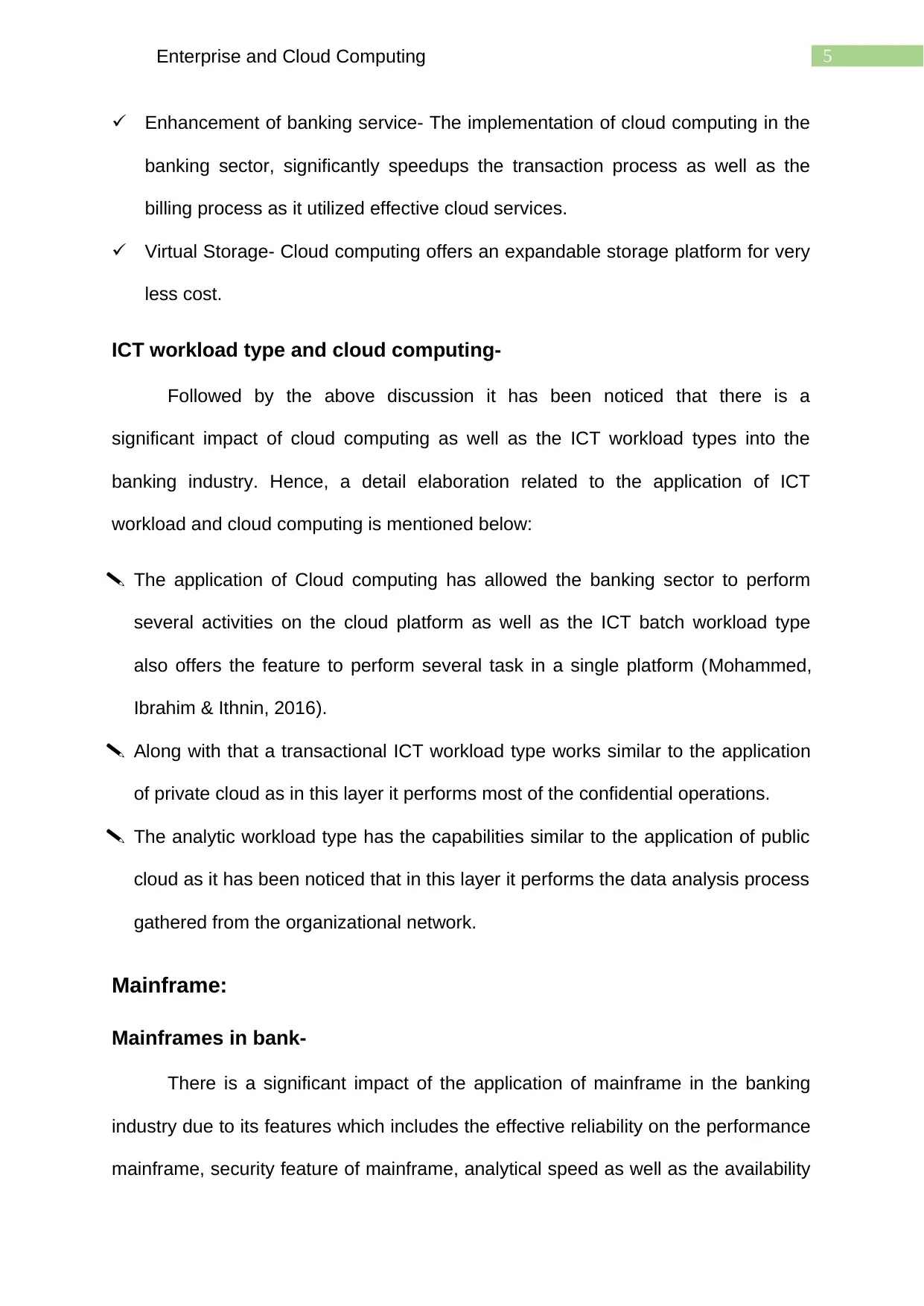
5Enterprise and Cloud Computing
Enhancement of banking service- The implementation of cloud computing in the
banking sector, significantly speedups the transaction process as well as the
billing process as it utilized effective cloud services.
Virtual Storage- Cloud computing offers an expandable storage platform for very
less cost.
ICT workload type and cloud computing-
Followed by the above discussion it has been noticed that there is a
significant impact of cloud computing as well as the ICT workload types into the
banking industry. Hence, a detail elaboration related to the application of ICT
workload and cloud computing is mentioned below:
The application of Cloud computing has allowed the banking sector to perform
several activities on the cloud platform as well as the ICT batch workload type
also offers the feature to perform several task in a single platform (Mohammed,
Ibrahim & Ithnin, 2016).
Along with that a transactional ICT workload type works similar to the application
of private cloud as in this layer it performs most of the confidential operations.
The analytic workload type has the capabilities similar to the application of public
cloud as it has been noticed that in this layer it performs the data analysis process
gathered from the organizational network.
Mainframe:
Mainframes in bank-
There is a significant impact of the application of mainframe in the banking
industry due to its features which includes the effective reliability on the performance
mainframe, security feature of mainframe, analytical speed as well as the availability
Enhancement of banking service- The implementation of cloud computing in the
banking sector, significantly speedups the transaction process as well as the
billing process as it utilized effective cloud services.
Virtual Storage- Cloud computing offers an expandable storage platform for very
less cost.
ICT workload type and cloud computing-
Followed by the above discussion it has been noticed that there is a
significant impact of cloud computing as well as the ICT workload types into the
banking industry. Hence, a detail elaboration related to the application of ICT
workload and cloud computing is mentioned below:
The application of Cloud computing has allowed the banking sector to perform
several activities on the cloud platform as well as the ICT batch workload type
also offers the feature to perform several task in a single platform (Mohammed,
Ibrahim & Ithnin, 2016).
Along with that a transactional ICT workload type works similar to the application
of private cloud as in this layer it performs most of the confidential operations.
The analytic workload type has the capabilities similar to the application of public
cloud as it has been noticed that in this layer it performs the data analysis process
gathered from the organizational network.
Mainframe:
Mainframes in bank-
There is a significant impact of the application of mainframe in the banking
industry due to its features which includes the effective reliability on the performance
mainframe, security feature of mainframe, analytical speed as well as the availability
⊘ This is a preview!⊘
Do you want full access?
Subscribe today to unlock all pages.

Trusted by 1+ million students worldwide
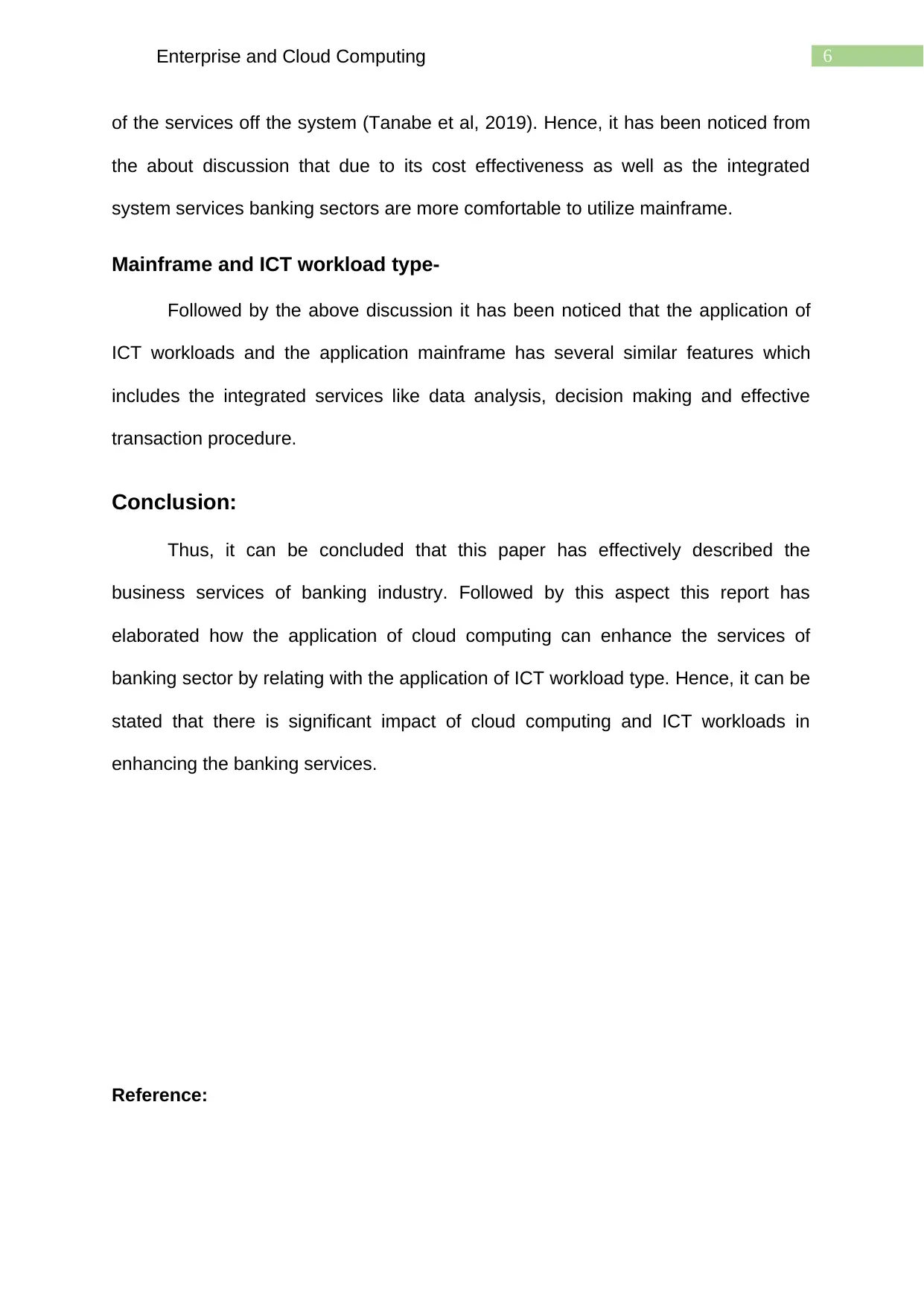
6Enterprise and Cloud Computing
of the services off the system (Tanabe et al, 2019). Hence, it has been noticed from
the about discussion that due to its cost effectiveness as well as the integrated
system services banking sectors are more comfortable to utilize mainframe.
Mainframe and ICT workload type-
Followed by the above discussion it has been noticed that the application of
ICT workloads and the application mainframe has several similar features which
includes the integrated services like data analysis, decision making and effective
transaction procedure.
Conclusion:
Thus, it can be concluded that this paper has effectively described the
business services of banking industry. Followed by this aspect this report has
elaborated how the application of cloud computing can enhance the services of
banking sector by relating with the application of ICT workload type. Hence, it can be
stated that there is significant impact of cloud computing and ICT workloads in
enhancing the banking services.
Reference:
of the services off the system (Tanabe et al, 2019). Hence, it has been noticed from
the about discussion that due to its cost effectiveness as well as the integrated
system services banking sectors are more comfortable to utilize mainframe.
Mainframe and ICT workload type-
Followed by the above discussion it has been noticed that the application of
ICT workloads and the application mainframe has several similar features which
includes the integrated services like data analysis, decision making and effective
transaction procedure.
Conclusion:
Thus, it can be concluded that this paper has effectively described the
business services of banking industry. Followed by this aspect this report has
elaborated how the application of cloud computing can enhance the services of
banking sector by relating with the application of ICT workload type. Hence, it can be
stated that there is significant impact of cloud computing and ICT workloads in
enhancing the banking services.
Reference:
Paraphrase This Document
Need a fresh take? Get an instant paraphrase of this document with our AI Paraphraser
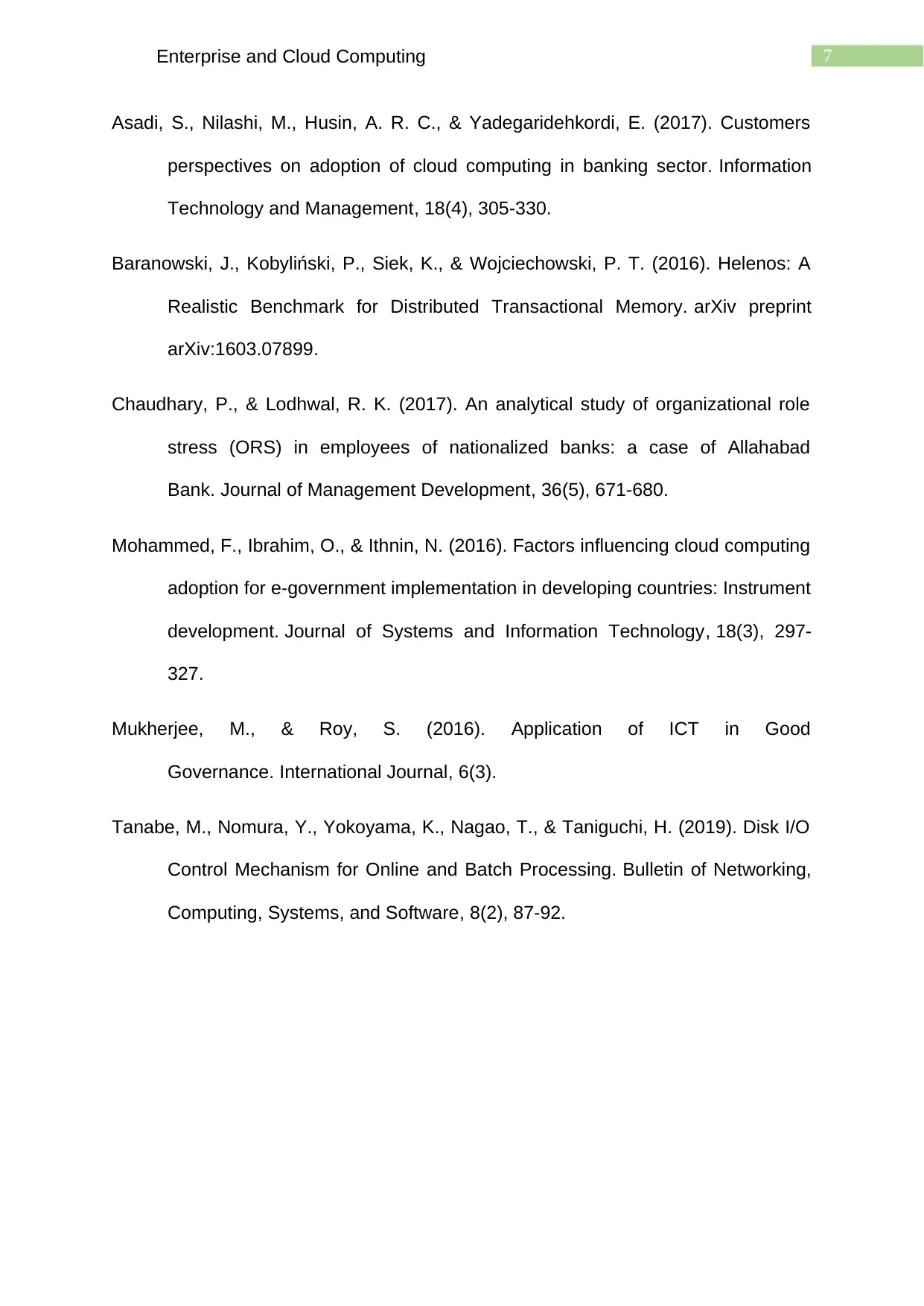
7Enterprise and Cloud Computing
Asadi, S., Nilashi, M., Husin, A. R. C., & Yadegaridehkordi, E. (2017). Customers
perspectives on adoption of cloud computing in banking sector. Information
Technology and Management, 18(4), 305-330.
Baranowski, J., Kobyliński, P., Siek, K., & Wojciechowski, P. T. (2016). Helenos: A
Realistic Benchmark for Distributed Transactional Memory. arXiv preprint
arXiv:1603.07899.
Chaudhary, P., & Lodhwal, R. K. (2017). An analytical study of organizational role
stress (ORS) in employees of nationalized banks: a case of Allahabad
Bank. Journal of Management Development, 36(5), 671-680.
Mohammed, F., Ibrahim, O., & Ithnin, N. (2016). Factors influencing cloud computing
adoption for e-government implementation in developing countries: Instrument
development. Journal of Systems and Information Technology, 18(3), 297-
327.
Mukherjee, M., & Roy, S. (2016). Application of ICT in Good
Governance. International Journal, 6(3).
Tanabe, M., Nomura, Y., Yokoyama, K., Nagao, T., & Taniguchi, H. (2019). Disk I/O
Control Mechanism for Online and Batch Processing. Bulletin of Networking,
Computing, Systems, and Software, 8(2), 87-92.
Asadi, S., Nilashi, M., Husin, A. R. C., & Yadegaridehkordi, E. (2017). Customers
perspectives on adoption of cloud computing in banking sector. Information
Technology and Management, 18(4), 305-330.
Baranowski, J., Kobyliński, P., Siek, K., & Wojciechowski, P. T. (2016). Helenos: A
Realistic Benchmark for Distributed Transactional Memory. arXiv preprint
arXiv:1603.07899.
Chaudhary, P., & Lodhwal, R. K. (2017). An analytical study of organizational role
stress (ORS) in employees of nationalized banks: a case of Allahabad
Bank. Journal of Management Development, 36(5), 671-680.
Mohammed, F., Ibrahim, O., & Ithnin, N. (2016). Factors influencing cloud computing
adoption for e-government implementation in developing countries: Instrument
development. Journal of Systems and Information Technology, 18(3), 297-
327.
Mukherjee, M., & Roy, S. (2016). Application of ICT in Good
Governance. International Journal, 6(3).
Tanabe, M., Nomura, Y., Yokoyama, K., Nagao, T., & Taniguchi, H. (2019). Disk I/O
Control Mechanism for Online and Batch Processing. Bulletin of Networking,
Computing, Systems, and Software, 8(2), 87-92.
1 out of 8
Related Documents
Your All-in-One AI-Powered Toolkit for Academic Success.
+13062052269
info@desklib.com
Available 24*7 on WhatsApp / Email
![[object Object]](/_next/static/media/star-bottom.7253800d.svg)
Unlock your academic potential
Copyright © 2020–2026 A2Z Services. All Rights Reserved. Developed and managed by ZUCOL.




